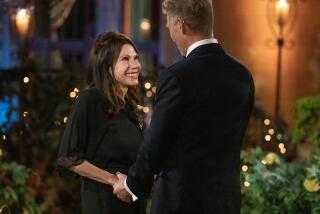TV show-running couples: the ultimate working marriage
Showtime’s new comedy “Episodes,” which recently concluded its first season, follows the adventures of a married couple in Hollywood as they adapt their British hit show to American TV. This being television, they are assailed by all manner of sexual and social silliness, but the show is still a rare example of art imitating life. Currently, at least a half-dozen successful shows, including “Big Love,” “The Good Wife” and “Blue Bloods,” are being run by writers who not only work but also sleep together. When they sleep. Which isn’t often. At least not during production.
FOR THE RECORD:
Show runners: In the Calendar section elsewhere in this edition, an article about TV show runners who are married and work together quotes Robert King as saying that he and his wife, Michelle, need to turn in a new script for “The Good Wife” every four days. They need to turn in a script every eight days. The error was discovered after the section went to press. —
Writing partnerships are the norm in Hollywood, and it is not unusual to have the co-creators of a television show oversee the writing and making of each episode (show running, in native parlance). But married show runners are far from standard, possibly because it seems such utter madness.
Imagine a world in which you and your spouse together write, pitch, sell, cast, staff and then make a television show — 12 episodes for cable, 22 for network. Writing is the easy part, the fun part, the part that you now barely have time to do because you now are managing writers’ rooms, actors and budgets, discussing with your spouse every living little detail, before and after the notes from network executives inform you what you’re doing wrong.
“It just never stops,” says Robert King, who with his wife, Michelle, created and produces “The Good Wife” for CBS. “Every four days, we need to turn in a new script.”
FOR THE RECORD: An article about TV show runners who are married and work together quotes Robert King as saying he and his wife, Michelle, need to turn in a new script for “The Good Wife” every four days. They need to turn in a script every eight days.
“We have to carve out time to think,” says Robin Green, who with her husband, Mitchell Burgess, writes and executive produces CBS’ “Blue Bloods.” “Someone asks me something and I say, ‘I need time to think about that,’ and I mean I have to make time. To think.”
Many previously strong unions have disintegrated under far less strain — the dreaded kitchen remodel or the simple act of pitching the family tent — and inevitably, on set or off, there are going to be, well, moments. “There’s going to be conflict when all the old baggage comes out,” says Mark V. Olsen, who created and produces “Big Love” with his husband, Will Scheffer. “The famous line around here is: ‘You wouldn’t talk to anyone else in the writers’ room like that.’ There are sections of the 210,” he adds, “where we regularly scream our guts out at each other.”
“You will disagree on what[ever] you are invested in,” says Dmitry Lipkin, who with his wife, Colette Burson, created and produces “Hung” for HBO. “It’s not something I would recommend if your marriage is in trouble,” adds Burson.
“You do annoy each other,” says Green, with the matter-of-factness born of experience — she and Burgess have been working together for almost 20 years. “We get on each other’s nerves at the same time each day — 2 o’clock.”
“2:30,” corrects Burgess. “I fade at 3.”
“Harsh words are exchanged,” says Green. “We say heated things, and it must terrify the people who can hear through the walls. One time,” she adds, laughing, “we actually had our hands around each other’s necks.”
So why on Earth would two people who claim to love each other choose do this?
Because it’s the only way it works for them.
“I don’t know how you would do this job without your partner,” says Green. “If you didn’t work with him, you’d never see him. And no man would put up with being married to a show runner unless he was doing it too.”
That is the sentiment shared by each of the five couples interviewed for this story. Running a show, they say, is such an overwhelming commitment of time, energy and passion that working without your spouse would be tantamount to having another one on the side.
“I thought I wanted to be a show runner alone,” says Scheffer. “Now it’s something I would never do on my own. The sacrifice is pursuing your own individual voice,” he adds, “but that is so much less than sharing this process. I don’t know if it would be worth it to do it another way.”
‘Do you take this writer?’
Though none of them met cute in some writers’ room, everyone’s courtship involved the early exchange of pages, even the Kings, who met in a shoe store where they were both working. “I was trying to write screenplays,” says Robert King. “I would write something and hand it to Michelle.”
One page led to another, and eventually they were married. Robert kept writing screenplays and Michelle kept commenting on them until they decided one would work better as a television show about a border town and they could both work on it. “We pitched it, and everyone loved it. Until the networks realized it was a show about Tijuana and no one would make it,” says Robert.
But they kept writing for pilot season and in 2006 produced the short-lived “In Justice.” By the time “The Good Wife” got a go, they had worked together for so long, the only real surprise was the show’s success — it was recently picked up for a second season. “We knew Julianna [Margulies] would get a good response,” says Robert, “but we were shocked by the response to the show. We wrote it so it could end at Episode 13.”
“Blue Bloods’” Green met Burgess when he enrolled in one of her writing classes at the Iowa Writers’ Workshop. She was so impressed with his talent that after she got a job writing for “Northern Exposure,” she called him when she had trouble generating stories. Soon Burgess was working on the show too; by the time they took a job on “The Sopranos,” they were a package deal.
Running a show, they say, is both harder — so much responsibility — and simpler — you don’t have to second-guess the creator — than writing it, and the rigors of a network show make them grateful to be a pair.
“It is not as gracious a pace as cable,” says Green, laughing.
Dan Futterman and Anya Epstein, who wrote and ran the third season of HBO’s “In Treatment,” did meet on set, but he was an actor and she was a writer who had just sworn off dating actors. Eventually, she swore back on, and after they were married, Futterman decided he would rather write. He began a script about Truman Capote while he and Epstein co-wrote a comedy. “Capote” took off — Futterman was nominated for an Oscar — but the comedy fizzled.
“It was hard for a while,” she says. “Danny was succeeding in my arena at the same time we were writing a script together.”
“Writing together was initially dicey,” says Futterman. “We each had to grow a thicker skin. Now it works pretty smoothly.”
More recently, they were writing a pilot for HBO about a transgender man when executives called to ask if they had any ideas about “In Treatment.” “Our main concern wasn’t about whether we could work together. It was whether we could write a half-hour of uninterrupted dialogue,” says Futterman, laughing.
Lipkin and Burson, on the other hand, helped run a theater company after they met in grad school at New York University. They came to Los Angeles because, Burson says frankly, “we had to make some money.” Four years ago, Lipkin created and ran “The Riches” for FX, and the two got a taste of informal collaboration. “When he was on the show and I was home, it seemed ridiculous that we weren’t working on it together,” she says.
The courtship of Olsen and Scheffer also began in the theater. Scheffer too had just made the switch from acting to writing and was teaching at a conference where he met Olsen, a lawyer who had just begun writing plays.
“Our version of getting intimate was to swap scripts,” says Olsen.
“We didn’t date at the conference, though,” adds Scheffer.
“No, we waited two weeks and then I moved in,” says Olsen, laughing.
The two spent years writing separately; Scheffer wrote “In the Gloaming;” Olsen wrote “Mary Chestnut’s Civil War.” Whenever Olsen would suggest they collaborate, Scheffer shut him down. “I felt that writers write from their own voice,” he says.
After the two moved to Los Angeles, Scheffer became more receptive to pitching a show together. On a drive home from Christmas in Nebraska with family, Olsen brought up the idea of polygamy. “I said, ‘Yuck,’” Scheffer says, “and he got really mad and said, ‘I’ll prove that this can be a great show.’ Which he did.”
Marriage and family
Although they differ in tone and format, the shows run by these married couples share one thing — complicated characters and even more complex relationships. All of the shows revolve in one way or another around the delicate balance that is marriage and family; “Big Love” is, in fact, a pointed reflection of the process from whence it sprung.
“‘Big Love’ is a tremendous validation of marriage,” says Scheffer. “That it is worth it to be involved in this incredibly dangerous, difficult thing because it bears fruit.”
That belief did not come easily when the two began working together. “I’m more of a workaholic,” Olsen says. “Will likes his down time. You start with the archaic assumption that it will be 50/50, and it is overall, but initially I became resentful — ‘Why isn’t he cranking out the pages?’ — and he became resentful — ‘You aren’t respectful of my process’ — so it took a while to realize that 50/50 doesn’t look a certain way.”
The balance between the writers can be emotional — “Hung’s” Burson says she is more comedic, her husband more soulful — or practical. “Blue Bloods’” Green says her husband is the point person on casting while she takes the lead on “detail work,” such as music cues and cuts. But everyone agrees that the best thing about working with your spouse is the built-in backup.
“It’s helpful to do this with Anya,” says Futterman, “because everyone likes Anya, and that’s not necessarily the case with me.”
And those us-against-the-world moments can make up for the inevitable “you always/you never” conflicts.
“Dmitry’s very gently tenacious,” says Burson. “It’s difficult for me to be mellow. It’s kind of a turn-on for me to see him handle things. Like ‘He’s so sexy the way he’s dealing with those notes.’ I’m really glad I’m going into battle with him.”
That teamwork is what network executives see, and what they remember, about their married show runners.
It isn’t much different from dealing with any producing partnership, says David Stapf, president of CBS Television Studios, except he does feel that when he’s talking to one, he’s talking to both. “I don’t feel a need to make the second call,” he says, “because they seem to speak with one voice.
“And,” he adds with a laugh, “I can get answers after-hours — I can tell one to tell the other to call me.”
Michael Lombardo, president of HBO, says there is a depth of development that the couples bring to their shows. “They have all obviously spent so much time talking together about character and story, have really hashed through everything between them in a way you can’t do on your own,” he says. “Our show runners work so well together that now it’s difficult to imagine working with one and not the other.”
The setup also makes it easier on producers who are parents, Stapf adds, and the parents in the group — the Kings, Epstein and Futterman, and Burson and Lipkin — agree.
“We can both work full days, and one of us can get home to be with the kids,” says Futterman. And although the network pace is less accommodating, for the Kings the alternative is not tempting. “We really can share everything,” Michelle says. “No one feels resentful because they got stuck with something or couldn’t do something, which you would if one of you were doing this and the other wasn’t.”
Although it clearly would not behoove any of these writers to complain about the situation they’re in, they all seem happy enough, or crazy enough, to do it again. “The Good Wife” and “Hung” are coming back next year, “Blue Bloods” and “In Treatment” are awaiting a decision. Meanwhile, Futterman and Epstein are working on the pilot about the transgender man, and though Olsen and Scheffer are figuring out what they will do next, they know it will be done together.
“There are times when I would like my marriage to be in a more gentle environment,” says Olsen. “But I guess overall I prefer the stressful us, when we’re dancing in a frying pan, because I know that this guy has my back.”
As for “Episodes,” well, none of them has seen more than a few minutes of the pilot. Not because they didn’t think it was a good idea or didn’t like it, but who has time to watch television?
More to Read
The biggest entertainment stories
Get our big stories about Hollywood, film, television, music, arts, culture and more right in your inbox as soon as they publish.
You may occasionally receive promotional content from the Los Angeles Times.







